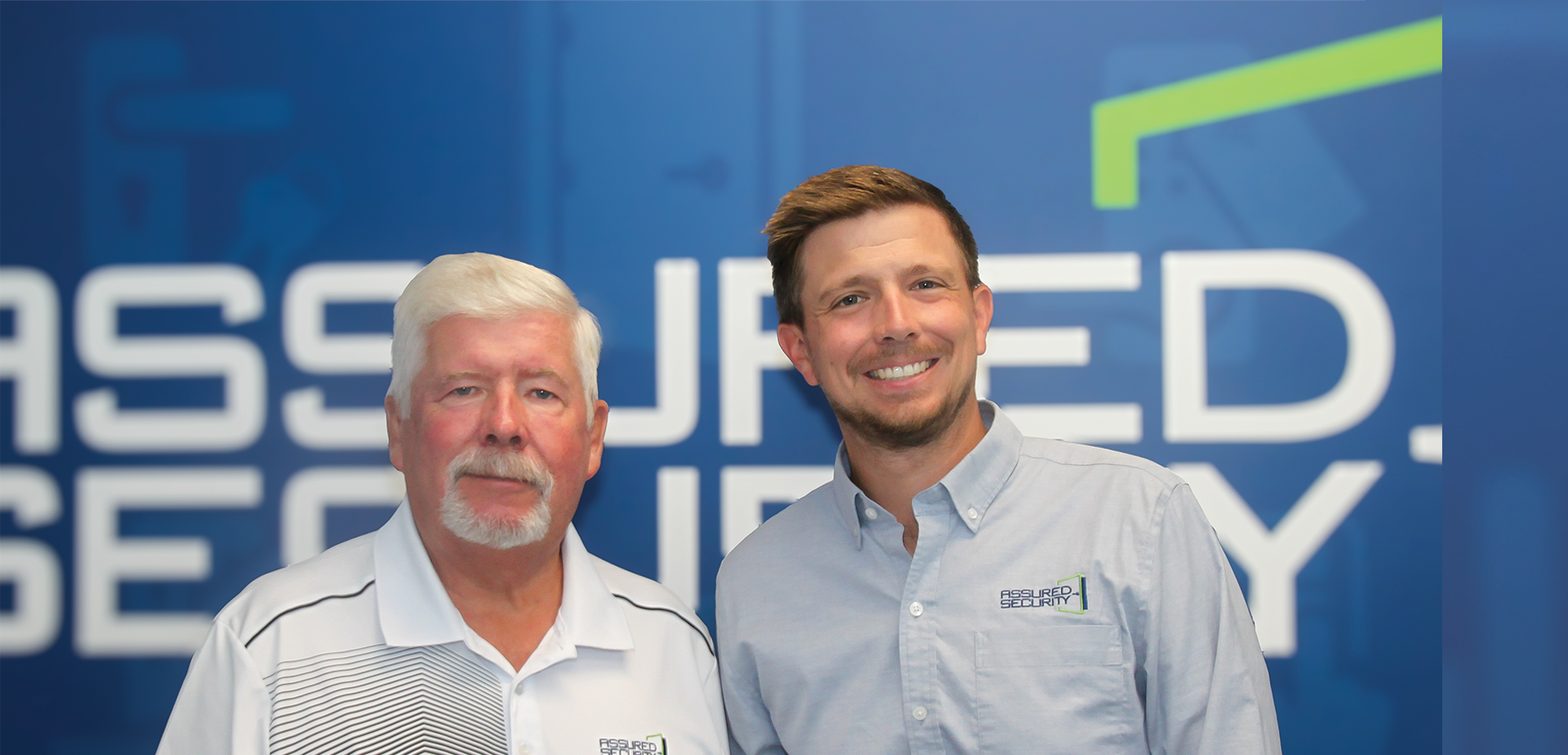
Successful Transitions in Family-Owned Businesses
By Katy Sullivan, Founder Substance & Sums Communications, Minneapolis
Family-owned businesses are built on legacy, relationships, and trust. But when it comes time to transition leadership and ownership to the next generation, those strengths can either ease the process or complicate it. For some, these transitions are a carefully orchestrated handoff, built on years of preparation. For others, it happens suddenly, with little time to plan.
The difference between a smooth transition and a painful one often comes down to how well families balance three things: preparation, communication, and flexibility. Successful handoffs rarely happen by accident.
When Tony Hokanson and his dad, Mark, decided it was time to start thinking about transitioning the family business, Assured Security, to the next generation, it didn’t come out of nowhere.
Since high school, Tony had worked the retail side of his dad’s locksmith business and moved into management and business operations after college.
From age 16, Tony had a feeling he’d want to continue in the family business or otherwise pursue entrepreneurship like his dad. By investing in this interest from a young age, Mark and Tony set their family up to create a succession plan that was rooted in experience and familiarity.
When parents step back from the company they’ve built, they’re not just transferring an asset. They’re entrusting a legacy. The next generation inherits more than financial responsibility; they take on the reputation, relationships, and values that have carried the business forward.
Families that thrive through this shift recognize that clients and employees alike need reassurance that the business they know and trust will remain steady. Longstanding customers and partners need to have confidence that the quality and trust they’ve built will continue seamlessly. Families that map out leadership responsibilities, establish timelines, and create opportunities for hands-on experience give the next generation the confidence and credibility they’ll need when the formal transition arrives.
Growing Into Leadership
The businesses that navigate transitions most gracefully take a long-view approach, letting the next generation grow into authority. That might mean years of working side-by-side with parents, or gradually assuming more responsibility while earning the confidence of employees. Learning the technical side of the business is one piece of developing the next generation.
Equally important is gaining relational and leadership skills that inspire trust. Clients and staff want to know that the incoming owner understands both the mechanics of the business and the people it serves.
Scale Bank is positioned to support these transitions. SVP Commercial Loan Officer Jeff Boyle says, “The most successful businesses are proactive. They start preparing years in advance, mapping out leadership responsibilities, and ensuring the next generation gains hands-on experience before the formal handoff. It’s not just about teaching technical skills; it’s about gradually building authority and visibility with both employees and customers.”
At Assured Security, the community that Mark built was as important to Tony as the business mechanics. Tony says, “My family has always prioritized keeping Assured Security a locally owned, customer-focused company. We’ve emphasized strong client relationships by sending the same techs back to customers to build trust, and we’ve always believed in surrounding ourselves with great people who share our values.”
When Tony took over the business, he didn’t let his ambition get in the way of asking questions and filling in gaps in his knowledge. He was open to feedback from his team and external advisors, like Jeff.
Keep Financing Flexible
Ownership transitions often come with financial complexity. Money is often where tension shows up most. Parents want financial security after years of investment and sacrifice. Children want flexibility that keeps the business viable without being crushed by debt. Families who navigate this well approach financing as a conversation rather than a negotiation.
Parents know they might maximize value by selling on the open market, but many prioritize keeping the business in the family.
Flexible financing structures like seller financing, phased buyouts, or arrangements where parents retain ownership of certain assets allow the next generation to take on responsibility while ensuring parents’ financial security. Jeff reinforces this approach, saying, “Flexibility creates breathing room and reduces stress for both generations.”

The common thread is compromise grounded by a shared commitment to keep the business in the family. Tony and Mark are a great example of two generations working together to identify a path forward that works for everyone. Tony says, “Naturally, there were different perspectives. My dad leaned more toward risk-averse, small-business ownership, while I was more growth-oriented. We worked through those differences with open conversations, balancing his desire for stability with my vision for expansion.”
Tony just finished buying out the business in 2025, but the runway to this milestone was years long. Since 2017, the company has acquired other businesses and added services beyond locksmithing. Tony became part owner in 2019, with the full transition taking place six years later.
Tony says, “My dad financed the purchase himself, essentially acting as the lender. He wanted predictable, guaranteed cashflow in retirement, while I wanted control and independence. It was important to create certainty and clean handoff in our business relationship, separating family from finances. This balance gave both of us what we needed for a smooth transition.”
Planning for the Unexpected
Even the best-laid succession plans can fall apart. A child may decide not to continue in the business, or financing may not come together. Families that anticipate these possibilities and identify alternative successors, whether another sibling, a trusted manager, or even an outside buyer—protect both the business and the family’s financial future. Having contingencies in place ensures the company doesn’t lose momentum during moments of uncertainty.
At the heart of every successful transition is open, honest communication. Parents and children must align on goals: What does financial security look like for the exiting generation? What freedoms and responsibilities do the incoming generation need to grow the business? When expectations are clarified, and conversations happen long before a sale or buyout, families avoid unnecessary conflict and set the stage for long-term success.
Tony says, “Every family dynamic is unique, so don’t expect your journey to mirror anyone else’s. Be completely transparent with family members — even when the truth is difficult. Transparency and trust are the foundations of a successful transition.”
Engaging Experts
Advisors and financial institutions are key partners in this process. “By helping families organize financials, connecting them with accountants and legal experts, and structuring financing that balances value with flexibility, banks like Scale can make transitions smoother,” Jeff says. Most importantly, they can act as a sounding board, ensuring families have thought through both the opportunities and the challenges of passing a business from one generation to the next.
Scale Bank works closely with families to design transition plans that support both continuity and confidence. When a business is passed to the next generation, Scale’s advisors help structure financing that aligns with family goals, from establishing phased buyouts to blending traditional lending with seller-financed arrangements.
By taking time to understand the business’s cash flow, long-term growth plans, and family dynamics, Scale creates solutions that protect the outgoing owner’s retirement security while empowering the next generation to lead with strength and flexibility. This partnership approach ensures that financial tools serve the family’s vision, not the other way around.
When business transitions are done with intention, the result is more than just a continuation of business operations. It’s a renewal of trust, a strengthening of relationships, and a bridge from one generation’s hard work to the next generation’s vision for the future.
In the end, family businesses that succeed across generations are the ones that treat succession not as a transaction, but as a shared journey rooted in legacy, guided by communication, and sustained by trust. Assured Security has grown from 13 to 52 employees over the course of the handoff from Mark to Tony, but its guiding principles have remained steady. Tony says, “Seeing our employees thrive and watching the business evolve while still maintaining our family-owned feel has been incredibly rewarding.”
Author Bio:
Katy Sullivan is a strategic communications leader and founder of Substance & Sums Communications, where she helps organizations and solopreneurs build reputation, awareness, and tell powerful stories. A Prosci® Certified Change Practitioner, she specializes in communications that support change, strengthen culture, and enhance leadership credibility. Her experience spans employee engagement, media relations, crisis management, and corporate community programs that connect business goals with meaningful impact.




